Election 2015: May, Trudeau, and Mulcair images improve, Harper negatives rise.
August 19, 2015
Overall Impressions
Public feelings about the leaders of Canada’s three main political parties has been shifting.

Negative feelings about Stephen Harper are on the rise. Mr. Harper’s best ratings in the last 18 months were last December, when 34% were positive and 38% were negative towards the Conservative leader. Since then, his negatives are up 9 points to 47%, the highest level since March 2014.
Tom Mulcair’s ratings had been stable until the spring of this year. Since May, his positives have risen from 27% to 41% while his negatives have stayed low.
For Justin Trudeau, the news is also good. His positives had been drifting down over several months, but have spiked back upwards by 5 points this month to 35%.
Elizabeth May’s ratings have increased slightly from last month from 17% positive to 25% positive.
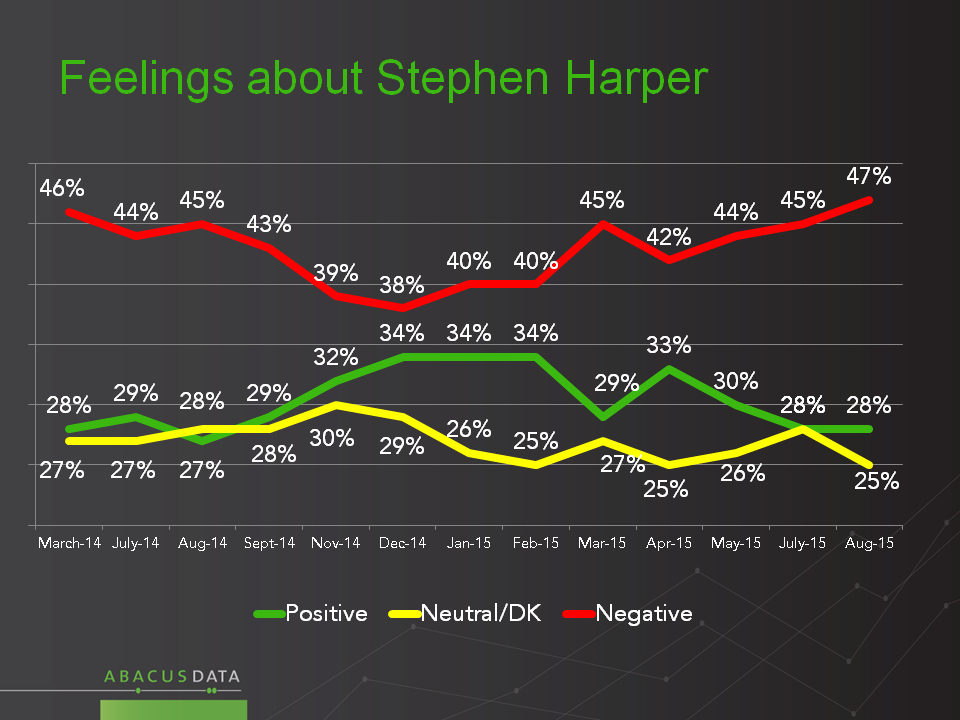

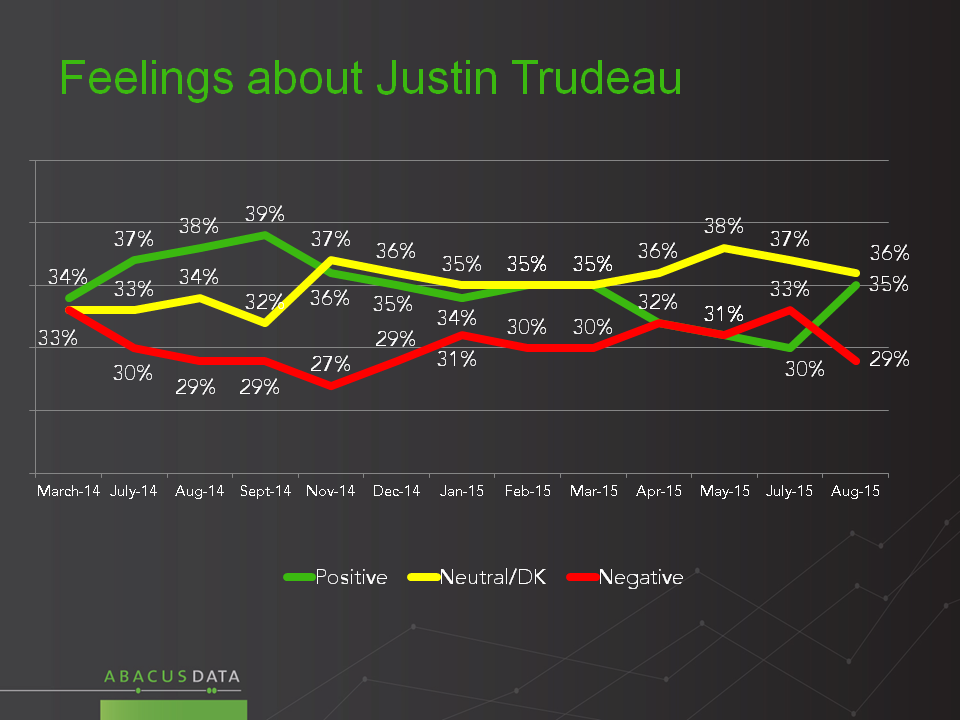
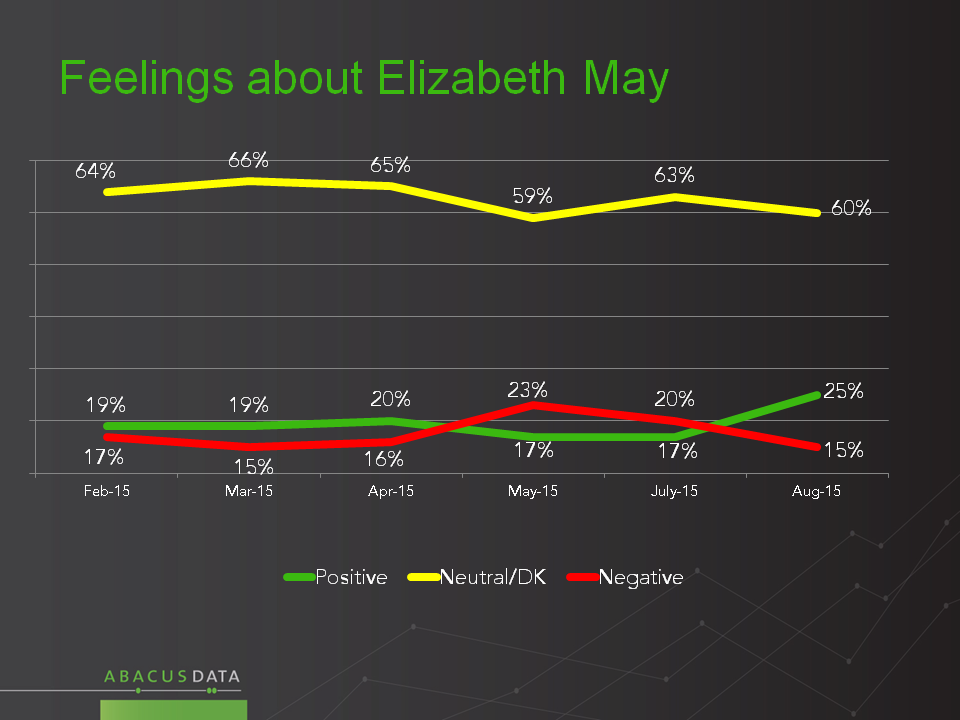
Leader Images
In this study we asked respondents to rate the leaders on a 10-point scale across a dozen dimensions.
The results show that:
• Both Thomas Mulcair and Justin Trudeau score more positively than Mr. Harper on 8 of the 12 dimensions: Principled, ethical, honest, accountable, good ideas, good heart, understands people like you, interesting.
• Mr. Harper leads the other leaders on two dimensions: tough, and ready to be Prime Minister.
• All three leaders score almost equally well for being smart.
• Mr. Mulcair scores better than Mr. Trudeau for being tough, while Mr. Trudeau gets higher scores than Mr. Mulcair for having “a good heart” and being interesting.
• Mr. Harper’s best scores are for being smart, tough, and ready to be PM. His scores are much lower for being honest, accountable, and understanding people like you
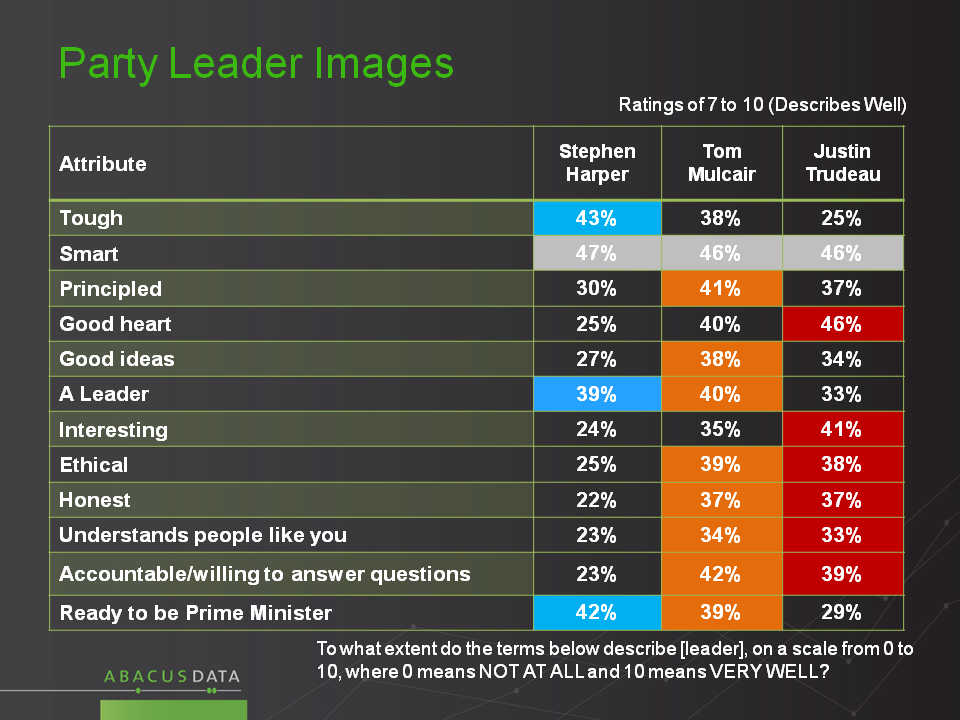
If the three leaders were to campaign nearby, and respondents could only go to one event, both Justin Trudeau (36%) and Thomas Mulcair (36%) would draw bigger crowds than Stephen Harper (28%). Worth noting are some important regional differences: Mr. Mulcair would draw particularly well in Quebec, while Mr. Trudeau would draw the biggest crowds in Ontario, Atlantic Canada, and BC.
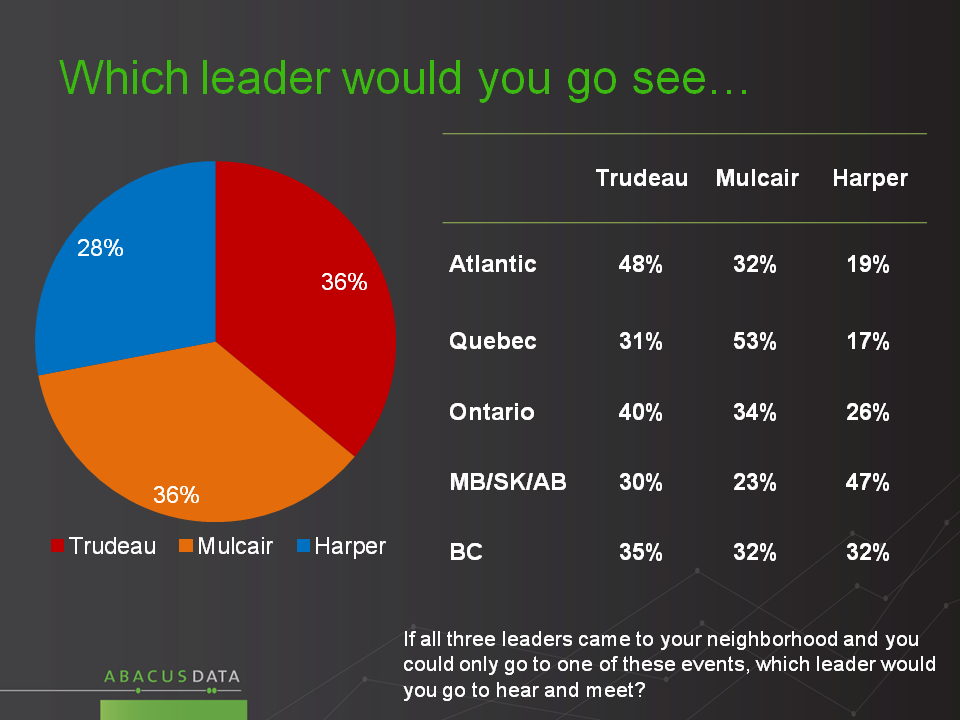
The Maclean’s Debate
Our probing about the impact of the Maclean’s debate suggests that it has had an impact on leader impressions. Among the 28% in our sample who watched/heard some or all of the debate, 24% said that Mr. Trudeau was the most effective, ahead of Tom Mulcair (20%) and Elizabeth May (20%) and Stephen Harper (18%). Worth noting is that among those who didn’t watch, Thomas Mulcair was deemed the most effective (12%).
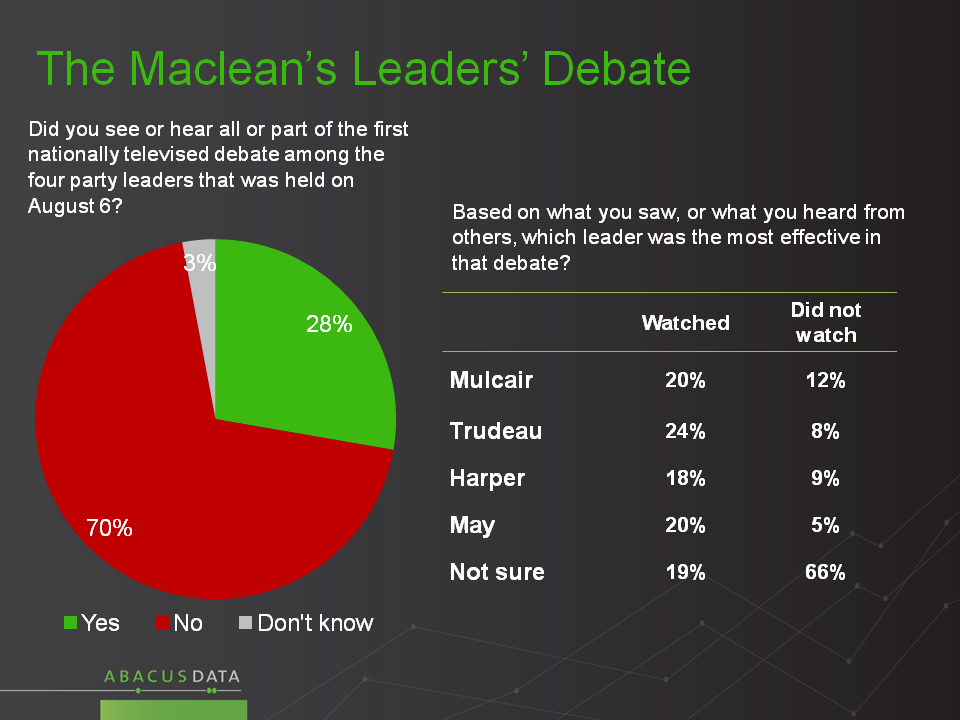
Because there were some different reactions expressed to Justin Trudeau’s closing remarks at the end of that debate (one journalist described them as ‘kind of horrible’) we decided to show the clip to people and ask them for their reactions. We will test other leader videos in upcoming surveys.
Among those who had a reaction to the clip, reactions were much more likely to be positive than negative (by a ratio of almost 4:1).
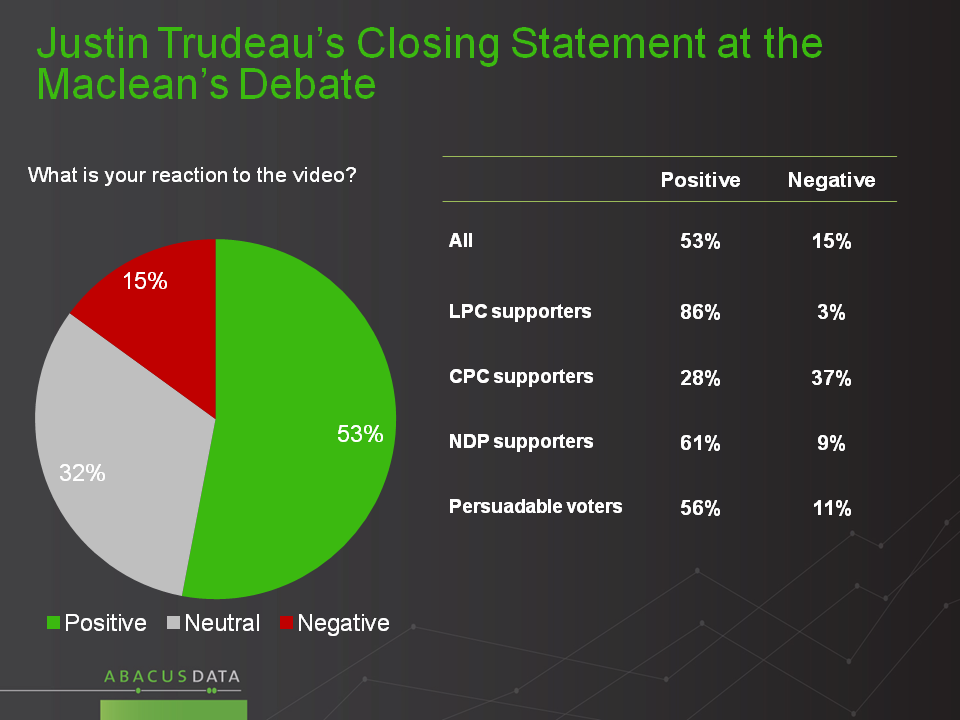
Not surprisingly, Liberal supporters were 86% positive, 3% negative. But among NDP supporters, reactions were 61% positive, 9% negative. And among persuadable voters the reaction was 56% positive, 11% negative. Among CPC supporters, reactions were mixed, but not particularly hostile: 28% positive, 37% negative.
When asked if the points made in the video clip made them more inclined or less include to vote Liberal, the results show positive impacts among Liberal, NDP, and persuadable voters.
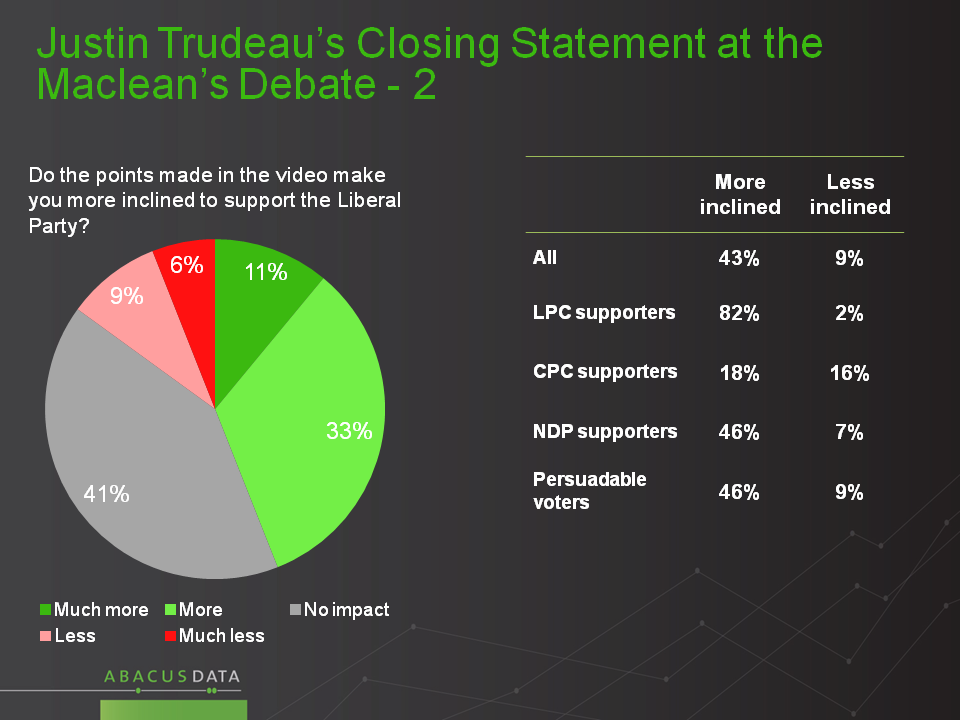
The Upshot
The results suggest that leader images are in flux and affecting voting inclinations. Stephen Harper’s overall popularity had been rising but more recently is in decline. He is seen as tough, smart and a leader, but his scores for ethics, honesty, and accountability are weak, and he is not seen as having a good understanding of the average person. In his earlier campaigns, he had managed to convey a more down to earth, hockey dad, Tim Horton ready image.
Thomas Mulcair’s image has been improving quickly, he is seen as tough, smart, principled and his scores for “good ideas” suggest that his opponents have not to this point been successful at raising doubts about whether NDP policy could have adverse impacts on the economy, or national unity.
For Mr. Trudeau, the results show that his personal reputation has improved since the campaign began. His debate performance was well judged by those who watched the debate. He is seen as smart, with a good heart, interesting, ethical, and honest, but his scores for “toughness” and “ready to be Prime Minister” lag those of his two main opponents.
In our first past the post system, these results suggest any of these leaders has enough positive feeling to win an election. The movements in our numbers are a reminder that things can change, and relatively quickly. At this early point in the campaign, we see some positive shifting for both the Liberal and NDP leaders, and a weakening trend for Stephen Harper, but this is a very early point in the campaign.
Methodology
Our survey, commissioned by Abacus Data, was conducted online with 1,439 Canadians aged 18 and over from August 14 to 17, 2015. A random sample of panelists was invited to complete the survey from a large representative panel of over 500,000 Canadians, recruited and managed by Research Now, one of the world’s leading provider of online research samples.
The Marketing Research and Intelligence Association policy limits statements about margins of sampling error for most online surveys. The margin of error for a comparable probability-based random sample of the same size is +/- 2.6%, 19 times out of 20. The data were weighted according to census data to ensure that the sample matched Canada’s population according to age, gender, educational attainment, and region. Totals may not add up to 100 due to rounding.
Abacus Data Inc.
We offer global research capacity with a strong focus on customer service, attention to detail and value added insight. Our team combines the experience of our Chairman Bruce Anderson, one of Canada’s leading research executives for two decades, with the energy, creativity and research expertise of CEO David Coletto, PhD.
In case you missed it:
Yesterday we released polling on the horse-race and other views on the election.
David Coletto joined Eric Grenier from threehundredeight.com on his CBC podcast, the Election Pollcast, to talk about the poll.
And don’t miss Bruce Anderson on the At Issue panel, on CBC’s The National this Thursday.




